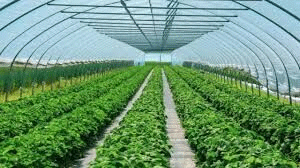Iran’s agricultural sector faces significant challenges due to limited water and soil resources. To address these issues, the Ministry of Agriculture has turned to greenhouse farming as a key strategy. Mohammad Mehdi Boroumandi, Deputy Minister of Horticulture, emphasized that greenhouses play a crucial role in sustainable agriculture, enabling efficient use of resources and enhancing productivity.
The Strategic Role of Greenhouses
Greenhouses allow for controlled environment agriculture (CEA), which optimizes growing conditions and resource use. This method has proven to be highly effective in Iran, where water scarcity is a pressing concern. Greenhouse farming not only conserves water but also improves crop yields and quality. According to Boroumandi, greenhouse projects have led to a 45% reduction in water consumption while increasing production per unit area.
Expansion and Economic Impact
Over the past year, the Ministry of Agriculture, in collaboration with the private sector, has significantly expanded greenhouse initiatives. A notable example is the 40-hectare greenhouse inaugurated last year, which now exports produce internationally. These large-scale projects underscore the economic potential of greenhouse farming. In a recent week celebrating agricultural achievements, the ministry inaugurated 2,437 projects worth 120 trillion rials ($4.8 billion USD), including 316 horticulture projects valued at 13.8 trillion rials ($552 million USD).
Integration with Horticulture and Medicinal Plants
The horticulture sector, a major component of the Ministry of Agriculture, has been actively developing greenhouses and producing medicinal plants. Iran’s diverse climate supports over 2,300 species of medicinal plants, which are well-suited to greenhouse cultivation. The ministry has launched a mega-project to establish a medicinal plant refinery, aiming to transform the value chain and boost this niche sector.
Enhancing Agricultural Productivity
Iran’s agricultural sector includes about 3 million hectares of orchards, supplying the country’s fruit needs and generating export surplus. However, many orchards, especially those classified as third-grade, struggle with low productivity. The ministry is addressing this through rehabilitation, replacement, and modernization of outdated orchards.
Research and Development
The Ministry of Agriculture collaborates with the Horticultural Sciences Research Institute to integrate scientific advancements into greenhouse farming. This partnership aims to ensure sustainable production practices and continuous improvement in agricultural productivity. Boroumandi highlighted the importance of knowledge transfer and innovation in achieving long-term sustainability in agriculture.
Iran’s strategic focus on greenhouse farming is a promising approach to overcoming its agricultural challenges. By optimizing resource use and enhancing productivity, greenhouses offer a sustainable solution that supports both local food security and economic growth. Continued investment and innovation in this sector are essential for achieving the Ministry of Agriculture’s goals and ensuring a resilient agricultural future for Iran.










